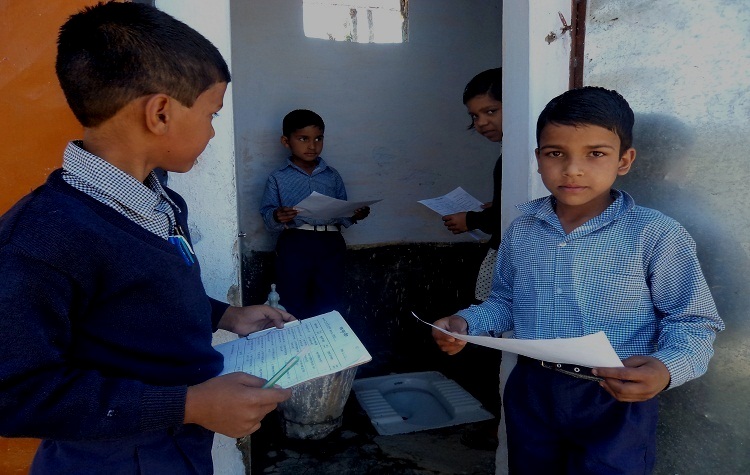The article is second of five part series that The Peeper Times is writing for Prayag, a first of its kind digital India mela being organised by New Delhi-based Digital Empowerment Foundation on Feb 25 at Surajkund, Faridabad.
If you want to transform a society, educate children for they are the best agents for change and development in their communities. That’s the mantra followed by several organisations working towards creating awareness about healthy sanitation practices among villages in the country. They are reaching the villagers through students.
“Through our ‘Child participation in Sanitation & Hygiene’ programme, we are trying to create awareness about hygiene, sanitation and nutrition among villagers. With the help of children, we have been successful in persuading villagers to build 210 toilets and 1,124 dustbins/garbage receptacles in their community,” said Sudhir Bhatt, Treasurer, Mountain Children’s Foundation (MCF). The organisation is currently working in 16 villages with more than 1,500 children and their families. It also conducts healthy home survey, in which a group of children visit different households and rate them on the basis of cleanliness, toilet availability at home and its usage, etc. The people/households which fare well in the survey are publicly acknowledged which, Bhatt says, acts as a motivation for others.
While children do help in creating atmosphere conducive for construction of toilets, bringing about a behavioral change in people is proving to be very challenging for the agencies
“People are more willing to build toilets when their children express the need for one,” said R. Stephen Diyali, Founder/Director, Mission for Anath Development and Welfare Society (MADWS). His organisation has been instrumental in putting an end to the practice of open defecation among people living in villages along the Ganga. Together with its partners, MADWS is aiding in construction of about 1000 households toilets in Uttarkashi. It is also educating people about environmental issues, e.g., how defecating on the banks of the Ganga is polluting the river, which is a key source of drinking water.
While children do help in creating atmosphere conducive for construction of toilets, bringing about a behavioral change in people is proving to be very challenging for the agencies.
“People tell us that all their life, they have been defecating in open. How then can they use toilets?” explains Diyali.
Agrees Bhatt, “There are many places where, even though, toilets are built, people are not using it.”
So how does one overcome such challenges?
“We try to find out about the diseases that villagers, esp. children, have suffered from in the recent past. We then explain the villagers about diseases that are caused by open defecation. We have seen that once they understand how vulnerable their children are, they become more open to change,” said Bhatt, adding, “We employ local workers in our awareness programmes. It helps a lot as people are more receptive to ideas from someone who belongs to their community.”
Employing local workers in awareness programmes helps as villagers are more receptive to ideas from someone who belongs to their community
There are, however, challenges which are beyond the realm of villagers like making water available 24X7 for toilets to remain functional. To overcome such issues, water pumps and storage facilities are being provided to villagers. “We have provided people with 100/200 litre synthetic water tanks to store water/rainwater to be used for toilets,” said Diyali.
Ever since the Centre has launched Swachh Bharat Abhiyan, there has been a lot of focus on sanitation. Under the Abhiyan, the government is constructing toilets in every household/community all across the country, creating awareness to bring about a behavioral change in people regarding healthy sanitation practices. Many agencies are working with government in this mission. There are Panchayati Raj Institutions (PRIs), NGOS, village level motivators (swachhata doots/sanitation managers), field functionaries like Accredited Social Health Activists (ASHA), anganwadi workers, school teachers and volunteers. And their efforts seem to be paying off. Against the target of construction of 66 lakh individual household toilets, about 28 lakh toilets have been built and construction of another 21 lakh (approx) is in progress. Similarly, while over five lakh community and public toilet seats are to be built, more than 1 lakh seats have already been built and another 1.30 lakh toilet seats are under construction. In 2016 alone, 502 cities and towns were declared Open Defecation Free (ODF). Another 237 cities and towns are set to become ODF by March this year, claims the government. Also, states like Gujarat, Andhra Pradesh, Sikkim have declared all cities and towns as ODF.
Although a lot of work has happened, much remains to be done. There are still places where awareness about toilets and government’s schemes haven’t reached, corruption cases and manipulation of data by people/agencies, in order to avail government benefits, are being reported at several places. The challenges are many. But a beginning has been made.
“We can see a positive change in the society. People are happy that they no longer have to go out in open to relieve themselves. Earlier, they used to fear for the safety of their children, women. No more now,” said Diyali.
You can meet the representatives of these and several such grassroots organisations doing exceptional work using digital tools at Prayag. The Peeper Times is Digital Empowerment Foundation‘s Media Partner for Prayag which will be held on Feb 25, 2017 at Surajkund, Faridabad, Haryana.
Do you feel strongly about something? Have a story to share? Write to us at info@thepeepertimes.com or connect with us on Facebook or Twitter



